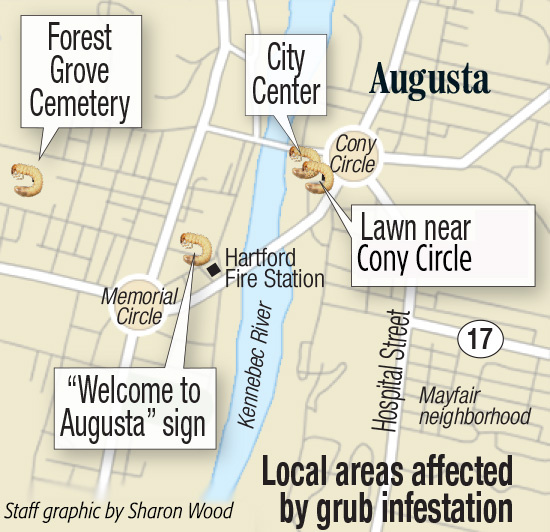AUGUSTA — Beetle grubs are eating much of the grass of Augusta from the roots up at an unprecedented speed, leaving behind swaths of brown, barren ground where once there were grassy lawns.
If city officials decide to attack the problem, costs could add up to a multi-year $100,000-plus grub fight.
Prominent spots in the city left either barren and brown or with weeds and crabgrass in place of the killed-off grass include the ground immediately surrounding the “Welcome to Augusta” sign that greets visitors to the city’s downtown, much of the lawn around Augusta City Center and Old Fort Western, athletic fields, cemeteries, both in-town rotaries, and parks across the city.
The solution would involve the use of chemical insecticides to kill off the grubs, and hydro-seeding to replace the many acres of dead grass now covering numerous city properties.
Leif Dahlin, community services director for the city, said he’s never seen anything like it. He said the grass is being eaten by grubs, the larval form of what will become Japanese or other beetles after emerging from the ground, which eat the roots and kill grass.
“They’ve killed a lot of acreage this year in Augusta,” Dahlin said. “City property, schools, private property, it’s everywhere. I’ve never seen anything like this is my 35 years in the business.”
Dahlin said whether the city should use insecticide to kill off the pests is a policy question, as is the matter of how much money to dedicate to the grub fight, both issues on which city staff would take direction from the Augusta City Council. He said city policy is to minimize the use of insecticides.
Councilors are scheduled to discuss the problem Thursday at a meeting, and hear a presentation on a grub prevention program from a turf consultant.
Currently there is no money in the city budget specifically targeted at addressing the grub problem, though $25,000 was added to the parks’ budget this year for beautification, which could be put toward taking on the grubs and restoring lawns.

A Japanese beetle larva
Dahlin, charged with the task of determining how widespread the problem is and how it might be addressed, estimated in a report to councilors it could require an initial budget of $100,000, not including school grounds, and require a multi-year effort, to kill off grubs and, in the program’s first year, repair and replace damaged turf including hydro-seeding of new grass seed. He said an ongoing “weed and feed” program is recommended for high priority areas annually. He said it could take at least two years to see enough program before a grub control program could be scaled back to a more modest approach.
He estimated of the 378 acres of grass in city parks, cemeteries and on other city and school properties, 142 acres could be considered for a grub treatment program, and 25 of those acres could need to be re-seeded.
In May, as councilors discussed the since-approved city budget, Mayor David Rollins expressed concern about the condition of lawns throughout the city, and a since-rejected proposal to cut the $25,000 beautification funds from the parks’ budget. He said seeing giant patches of bare earth was leaving a bad impression with people entering the city.
Councilors are scheduled to discuss the problems with grubs, and potential solutions, when they meet at 6:30 p.m. Thursday in council chambers at Augusta City Center.
Councilors are also scheduled to:
• Discuss a proposed ordinance amendment to require residents to license their cats, and contain them to their property or keep them restrained, as dog-owners are required to do already.
City Manager William Bridgeo said the proposal to require licensing and regulation of cats was placed on the council agenda by Ward 1 Councilor Linda Conti, at the request of a constituent who has had ongoing difficulties with neighbors’ cats on her property. A model ordinance Bridgeo forwarded to councilors would require cats, like dogs, to be kept “under restraint” at all times, which the ordinance defines as within the property limits of its owner, secured by a leash, or under the control of a responsible person.
• Continue discussion of a proposal to convert downtown Water Street from one-way to two-way traffic;
• Discuss the five-year capital improvement plan;
• Discuss establishing a set of core values for the City Council;
• Discuss food sovereignty; and
• Discuss Middle Street parking rule changes.
Keith Edwards — 621-5647
Send questions/comments to the editors.





Comments are no longer available on this story